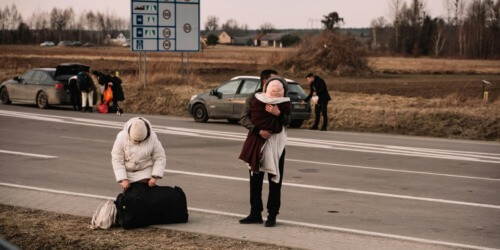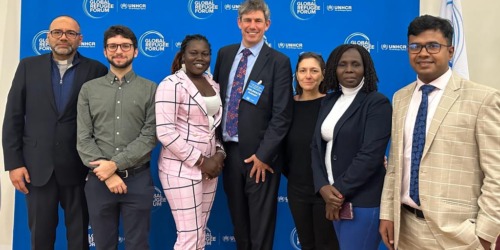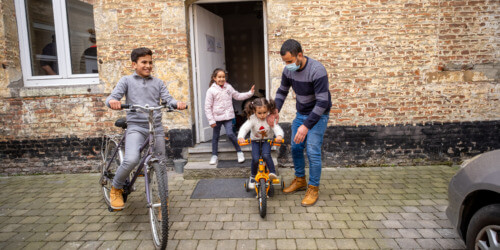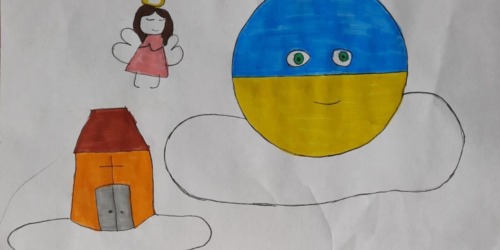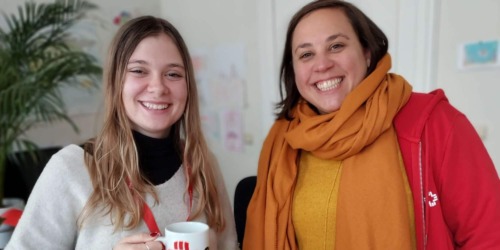The label “undocumented” is designated to any person who does not have – or no longer has – a residence permit allowing them to reside permanently in Belgium. We avoid the terms “illegal,” “clandestine” and “alien” because they make it seem as if these people have broken the law and are criminals. However, they have not committed a crime; they live “simply” in an administrative irregularity. An undocumented person finds themselves in an irregular situation either following the expiration of a visa, which gives authorization to non-Europeans to enter Belgium regularly for a specific time period; or a residence permit, which gives the person permission to stay longer in Belgium, or they had an irregular entry into the territory.
EXPIRATION OF A VISA OR RESIDENCE PERMIT
The visas and residency permits are generally valid for a limited time and are often subject to certain requirements at the time of renewal: such as an employment contract, stable income, and if the person has come for family reunification, and a valid marriage contract. This situation implies that many foreigners cannot afford to lose their job, to fall ill, or to separate from their spouse under the penalty of having to leave the territory. Since 78% of visas for family reunification are granted to women[1], the latter are particularly vulnerable.
“I received a residency permit to join my [Nigerian] husband as part of a family reunion. He was in charge of the administrative aspects and he did not take the necessary steps to renew my residency permit after five years. After having insisted that he could remedy the situation, it was too late because he lost his job and therefore could not meet the conditions for renewal. He then went to work abroad without a residency permit, and it was impossible to follow him. With the distance, we finally separated and I am still undocumented today.” Amy, 45, has lived in Belgium for 11 years.
IRREGULAR ENTRY INTO THE TERRITORY
When entering the country irregularly, some people do not file an application for international protection and fall de facto in an irregular situation. Why don’t they apply? They do not know their rights[2], they are bound to the Dublin regulation[3], or they do not meet – or believe that they do not meet – the conditions to qualify for protection.
Others file an application for international protection after an irregular entry, but their application is rejected, as was the case for 5,156 people in 2018[4]. Some then decide to return to their countries of origin while others choose to stay. The latter then become undocumented. This is the case for Mohammed, who came from Iraq. “They said that I did not have enough proof that I was tortured. Therefore, my request was refused twice. What can I do? It is impossible to return there and it is impossible to regularize my situation here!”
HOW TO SURVIVE WITHOUT DOCUMENTS IN BELGIUM?
- How to generate income
Finding an income is one of the main difficulties for undocumented immigrants. They can not benefit from social aid and the law forbids employers from hiring people who do not have visas or residency permits. This is why most people without papers only have two options for making money: network solidarity or moonlighting. An undocumented person is therefore extremely dependent on their network or their employer.
Some employers abuse this dependency and use it to their benefit by paying them less money, excessive flexibility, total lack of coverage, continual pressure, creating competition between workers, etc. These working conditions can lead to human trafficking [5].
Yet undocumented immigrants – like every human being – have fundamental rights even in the absence of a residency permit or visa: the right to lead a family life, the right to health, the right to education, access to justice, respect for human dignity, labor rights – including the right to minimum wage. However, how can you claim your rights from a feared state authority? How to prove a contractual relationship when the contract is oral and the payment is in cash?
- How to access basic services?
People without papers cannot benefit from any aid – with the exception of urgent medical assistance and access to education for minors. “I stopped my studies at 18 to help my parents work. I’m cleaning up for now, but I think I could have done more. I would have liked to be a nurse…” says 24-year-old Susanne from Kosovo.
Not having the right documents complicates any process, including activities that seem harmless. Authorities often require formal financial guarantees (pay slips etc.) and valid bank statements. “One day, my brother and I were stuck at the station because the ticket offices were closed and the machines only accepted bank cards. We do not have that of course, because banks refuse to open an account for us. Fortunately, someone was kind enough to help us;” says Susanne from Kosovo.
These daily difficulties can potentially cause serious psychological harm, which could be intensified by the constant fear of being arrested, detained in a detention center, and being deported.
REGULARIZATION IS THE ONLY SOLUTION TO REMEDY THE SITUATION
Regularization is an administrative procedure that allows a person who does not have – or no longer has – a residence permit in Belgium to obtain a residency permit while being on Belgian soil[6]. It is possible to get this for two reasons:
- Regularization for humanitarian reasons (article 9 of the law of December 15th, 1980): In the case of exceptional circumstances that justify the fact that the request is not made abroad, an undocumented person can request a regularization.
- Regularization for medical reasons (article 9 of the law of December 15th, 1980): An undocumented person suffering from a serious illness and whose treatment is not possible in their country of origin can obtain a residency permit for the duration of their treatment.
These two articles are interpreted very strictly by authorities. In regards to medical reasons, the Foreigners Office’s rigorous assessment of the few existing criteria (severe illness, accessibility of treatment, etc.) allows regularization of only a paltry number of patients. Meanwhile, there is no defined criteria for regularization for humanitarian reasons so the Foreigners Office has full discretion. In 2009, criteria were temporarily set which resulted in a wave of regularization. Since then, however, the issue has never been put back on the political agenda and the number of regularizations for humanitarian reasons was the lowest it has ever been in 2016, and 2009 was the lowest for medical reasons[7].
WHAT POLITICAL CHANGES ARE NECESSARY?
Caritas is calling for various policy changes to address the vulnerable situation in which many undocumented men and women find themselves:
- More legal pathways
More safe and legal pathways would prevent a number of people from falling into a situation of administrative irregularity. We call for ambitious legislation that would facilitate the migration of more or less skilled workers, particularly in sectors with shortages, and for more flexibility in processing family reunification applications[8].
- Access to basic services
Improved access to social benefits and basic services for undocumented people would decrease poverty and other hardships that immigrants face today.
- A voluntary return policy
Having a voluntary return policy would give some people the opportunity to leave their vulnerable situation. However, the decision to return to one’s country of origin must always be personal and voluntary.
This article was created within the framework of the MIND project, which receives financial support from the European Union program for development awareness and education (DEAR). This content is the responsibility of Caritas International only and does not necessarily reflect the opinion of the European Union.
![Caritas International Belgium Undocumented migrants in Belgium: causes and consequences [Long Read]](https://www.caritasinternational.be/wp-content/uploads/2018/03/flag_yellow_low-300x201.jpg?x76704)









![Caritas International Belgium Undocumented migrants in Belgium: causes and consequences [Long Read]](https://www.caritasinternational.be/wp-content/uploads/2018/06/180219caritas_AM351-1140x641.jpg?x76704)
